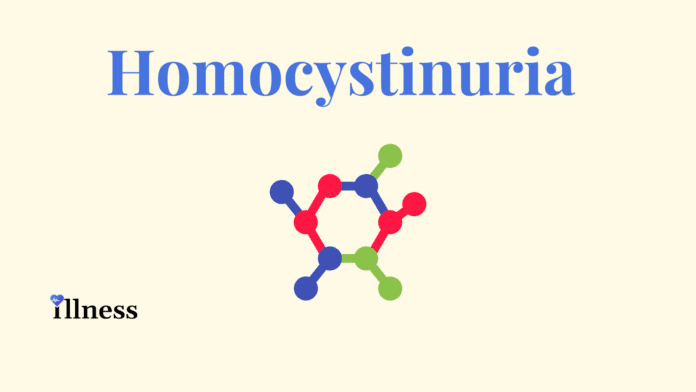Overview Of Homocystinuria
Homocystinuria is a genetic disorder that affects the metabolism of the amino acid methionine. Amino acids are the building blocks of life.
Commonly Associated With
Cystathionine beta-synthase deficiency; CBS deficiency; HCY
Causes Of Homocystinuria
Homocystinuria is inherited in families as an autosomal recessive trait. This means that the child must inherit a non-working copy of the gene from each parent to be seriously affected.
Homocystinuria has several features in common with Marfan syndrome, including skeletal and eye changes.
Symptoms Of Homocystinuria
Newborn infants appear healthy. Early symptoms, if present, are not obvious.
Symptoms may occur as mildly delayed development or failure to thrive. Increasing visual problems may lead to a diagnosis of this condition.
Other symptoms include:
- Chest deformities (pectus carinatum, pectus excavatum)
- Flush across the cheeks
- High arches of the feet
- Intellectual disability
- Knock knees
- Long limbs
- Mental disorders
- Nearsightedness
- Spidery fingers (arachnodactyly)
- Tall, thin build
Exams & Tests
The health care provider may notice that the child is tall and thin.
Other signs of homocystinuria include:
- Curved spine (scoliosis)
- Deformity of the chest
- Dislocated lens of the eye
- If there is poor or double vision, an eye doctor (ophthalmologist) will perform a dilated eye exam to look for dislocation of the lens or nearsightedness.
- There may be a history of blood clots. Intellectual disability or mental illness is also possible.
Tests that may be ordered include any of the following:
- Amino acid screen of blood and urine
- Genetic testing
- Liver biopsy and enzyme assay
- Skeletal x-ray
- Skin biopsy with a fibroblast culture
- Standard ophthalmic exam
Treatment Of Homocystinuria
There is no cure for homocystinuria. About half of people with the disease respond to vitamin B6 (also known as pyridoxine).
Those who do respond will need to take vitamin B6, B9 (folate), and B12 supplements for the rest of their lives. Those who do not respond to supplements will need to eat a low-methionine diet. Most will need to be treated with trimethylglycine (a medicine also known as betaine).
Neither a low-methionine diet nor medicine will improve existing intellectual disability. Medicine and diet should be closely monitored by a doctor who has experience treating homocystinuria.



